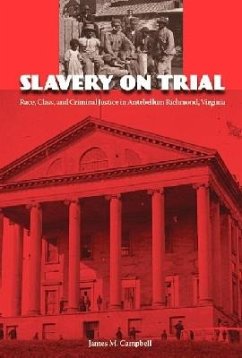"An invaluable study of Richmond's antebellum justice system."--Sally E. Hadden, Florida State University "Not only demonstrates the law's clear bias in favor of the power of slaveholders and the defense of slavery, but also gives us vivid scenes of slaves, free blacks, and working-class whites negotiating and sometimes contesting society's class and color lines before the bar."--Gregg D. Kimball, Library of Virginia By the mid-nineteenth century, Richmond was one of the preeminent industrial centers in the South, with a level of criminal activity that reflected its size. Slavery on Trial examines more than 7,000 criminal cases recorded between 1830 and 1860, ranging from sensational murders to minor misdemeanors. Although the criminal justice system in antebellum Virginia was explicitly designed to support slaveholders' rule, James Campbell reveals that, in practice, trials and punishments sometimes subverted elite interests. Rather than serving as an unproblematic prop of the slave regime, law enforcement and court proceedings in Richmond revealed class, race, and gender tensions. Campbell shows that considerations of race and slavery infused every criminal case in Richmond, even when slaves were not directly involved as victims or defendants. He also considers the relationship between judicial processes and social, cultural, and political developments in the city. Slavery on Trial is a sobering portrait of the administration of racially constructed laws. It exposes the contradictions inherent in antebellum Southern law, and examines the implications those contradictions had for slaves, free blacks, poor whites, immigrants, and women. James M. Campbell is a lecturer in American history at the University of Leicester.
Hinweis: Dieser Artikel kann nur an eine deutsche Lieferadresse ausgeliefert werden.
Hinweis: Dieser Artikel kann nur an eine deutsche Lieferadresse ausgeliefert werden.








